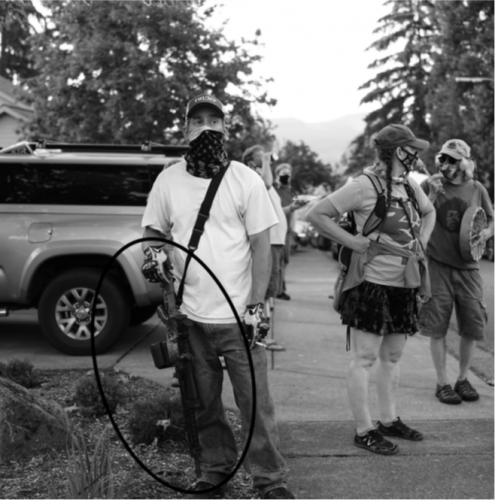
The July 29 Thurston neighborhood clash between Black Lives Matter-related protesters, police and counter-protesters continues. This time in federal court.
On March 8, the Civil Liberties Defense Center and Black Unity protesters filed a federal civil rights lawsuit against the city of Springfield, the police department and several other named and unnamed officers.
The lawsuit divulges new information about police interaction with counter-protesters and Thurston-area residents, and that police engaged in aggressive and racist tactics against protesters. It argues police violated protesters’ rights under the First, Fourth and 14th Amendments.
On July 29, the group Black Unity had organized a march in the Thurston neighborhood of Springfield in response to a Black resident of the area sharing a photo of her neighbor’s yard, which had a noose. Although neighbors said in a Dec. 10 forum with investigator Rick Braziel that the noose was a year-round Halloween decoration, the lawsuit said there was also a “Don’t Tread on Me” flag. According to the Southern Poverty Law Center, this flag is one of the symbols of the right-wing militia movement.
The day before the march, while in uniform, Springfield police officer Joseph Burke approached the resident who initially felt threatened by the noose and a Black Unity member. The one-hour long interaction was filmed on camera and the officer “repeatedly informed the women that their concerns were ‘ridiculous;’ that he perceived Black Unity as a threat to the community; and that he believed that they and Black Unity were coming to make trouble for the neighborhood,” according to the filing.
Burke then told the Black Unity member that people viewed the group as a threat and that the group just wanted to “cancel” the person with the noose in front of their house, the filing said. Burke called the neighbor on the phone, informing the person about the protest and saying “The Black Unity group is hell-bent on making an example of the noose that’s hanging around that skeleton’s neck. They don’t care — they’re intent on canceling you.”
Burke then told the resident and Black Unity member that they’re trying to create a false narrative for their propaganda efforts and that his feeling was that “all lives matter.”
Afterward, a white female neighbor asked Burke why he was there and he said, “There’s going to be a thing — the fact that this guy’s decoration — part of that thing is instigating this response at Jesse Maine Park tonight,” according to the filing. Police officers went door to door telling residents about the protest, saying the police would be overwhelmed and would need their help to control it.
According to body camera footage obtained from the July 29 event and other documents, CLDC argues police engaged in racist and aggressive tactics during the protest.
The lawsuit shows one police officer used profane comments to others about the protesters, according to the filing. Police officer D.L. Casarez said, while pointing at a Black Unity supporter, “I want that fat bitch to go to jail.” After police arrested Tyshawn Ford, Casarez said, “These fuckers, I wanna lock even more of ‘em up.”
And reflecting on the situation where police and protesters sparred at the barricade, Casarez said, “Finally, we did something though! Finally! Fuck yeah, dude! When they fucking took that thing off, both things — you good? — and they were trying to shove it back on us… and it was comin’ over and I fuckin’ grabbed it and just chucked it back, that stupid 12 year old [inaudible] took it right in the fuckin’ face [laughter] like just right [inaudible]… At least we fuckin’ took a stand, just once [laughter].”
Wilson wrote in his report that the counter-protesters “worked with police to assist” law enforcement after the protest.
Another officer named in the filing, R.J. Conrad was at a police barrier E. 68th and Dogwood when a person told him that he saw people hop out of four pickup trucks with guns and say, “We’re goin’ shoot these fuckin n******.” Conrad replied, asking what he was supposed to about it and then tried to turn off his body camera, according to the lawsuit. The officer didn’t provide this information in his written report about a threat of racially motivated violence, the filing added.
The lawsuit also argues that Springfield police engaged in selective policing. Officer P.P. Kirkpatrick directed a woman named Geena Shipman and other counter-protesters to the location where Black Unity protesters were.
Shipman would later attack a protester and make a false report to the police about it, according to the lawsuit.
Officer Jared Quinones said in his report that under normal circumstances, Shipman’s behavior would have been disorderly conduct,” but her behavior was not isolated enough to mandate arrest.”
The city of Springfield hired an independent party to investigate the July 29 protest. The investigation is still in process.
Plaintiffs in the lawsuit are demanding that the city of Springfield to order a five-year plan to reform the police department, which includes implementing an independent monitor, as well as mandate community policing reforms and force police reforms. Plaintiffs also seek punitive damages.